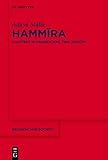Hammira : chapters in imagination, time, history
Material type: TextSeries: Religion and society (Hague, Netherlands), 83Publication details: Berlin Walter de Gruyter GmbH 2021Description: xviii, 214pISBN:
TextSeries: Religion and society (Hague, Netherlands), 83Publication details: Berlin Walter de Gruyter GmbH 2021Description: xviii, 214pISBN: - 9783110659597 (hb.)
- 954.40234092 MAL
| Item type | Current library | Collection | Call number | Status | Date due | Barcode | |
|---|---|---|---|---|---|---|---|
 Book
Book
|
Plaksha University Library | Faculty Publication | 954.40234092 MAL (Browse shelf(Opens below)) | Available | 002524 | ||
 Book
Book
|
Plaksha University Library | Faculty Publication | 954.40234092 MAL (Browse shelf(Opens below)) | Available | 002525 |
Browsing Plaksha University Library shelves, Collection: Faculty Publication Close shelf browser (Hides shelf browser)

|

|

|

|

|
||
| 954.4 MAL Sri Devanarayana katha : maravara ka paramparika gayana | 954.4 MAL Sri Devanarayana katha : maravara ka paramparika gayana | 954.4 MAL Sri Devanarayana katha : maravara ka paramparika gayana | 954.40234092 MAL Hammira : chapters in imagination, time, history | 954.40234092 MAL Hammira : chapters in imagination, time, history |
https://www.degruyter.com/document/doi/10.1515/9783110662795/html?lang=en
"This book is about the legendary Rajput chieftain Hammira Chauhan, the king of the impregnable fortress of Ranthambore in southern Rajasthan who died in 1301 CE after a monumental battle against Alauddin Khalji, the sultan of Delhi. This singular event reverberates through time to the point of creating a historical and cultural region that crystallizes through copious texts composed in different genres and languages (Persian, Sanskrit, Hindi, Rajasthani, English) in shifting religious and political contexts, medieval as well as modern.
The main poetical-historical work composed in Sanskrit, the Hammira-Mahakavya (‘great poem’) by the Jaina poet Nayachandra Suri (15th century), is propelled by a dream in which the dead king urges the poet to write about his deeds. Can history with its preoccupation for the factual, begin in a dream? What does it mean to think about history and time via the imagination? Is time, whether past, present or future linked to imagination? Do imagination, time, and history arise together? What are the implications of thinking of history as something that appears in our experience? What does it mean to write a history as a historical being in whom diverse temporalities intertwine in the here and now?"
There are no comments on this title.

